Orchestral Management is one of three pathways on the College’s Arts Management MA course.
We spoke to two current students, Hannah Staniford and Helen Phipps, about their time on the course so far, and how it’s preparing them to work in the industry.
Why study Orchestral Management?
Hannah became interested in orchestral management while she was in the second year of her undergraduate music degree, studying here at the College.
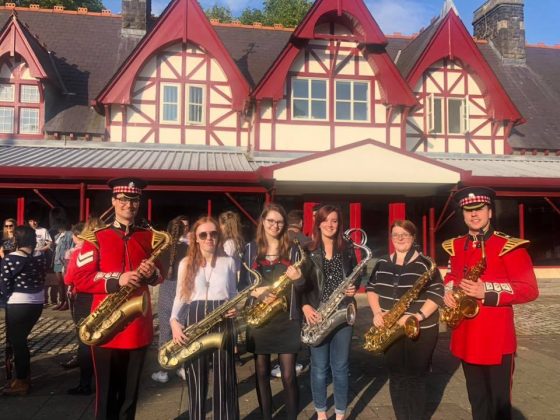
Hannah (second on the left) pictured with other Saxophone students during her Undergraduate studies.
‘I worked on a REPCo project and that’s what made me decide it’s what I wanted to do. Over the next two years, I got some shadowing and orchestral management opportunities.
I chose the course because I realised that although performing just wasn’t for me, I get a buzz off organising and putting on a show.’
Helen Phipps also did her undergrad at the College, but like Hannah realised that she didn’t actually want to become a professional player.
‘I began to explore things, and from there did the Arts Management undergrad module to see if I liked it, which I did. It was always engaging, and from there I knew it’s what I wanted to do.’
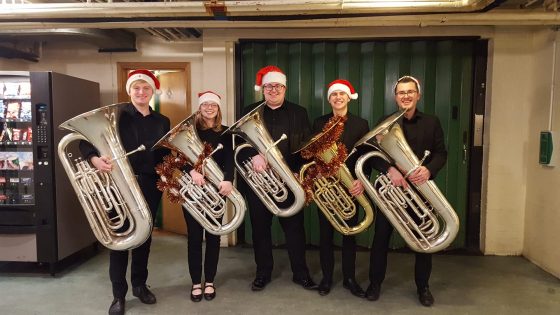
Helen with the Tuba section after a Christmas concert during her Undergraduate studies.
‘I did my research and really liked the practical elements of this course, working alongside industry professionals on work placements, so you actually gain real experience.’
Learning from Experience
‘In the first term we had Orchestral Management class every Monday.
The module is led by Michael Garvey (who was previously the director of BBC National Orchestra and Chorus of Wales (BBC NOW) and we also had visiting speakers,’ explained Hannah. ‘I don’t think you can get that anywhere else in the country.’
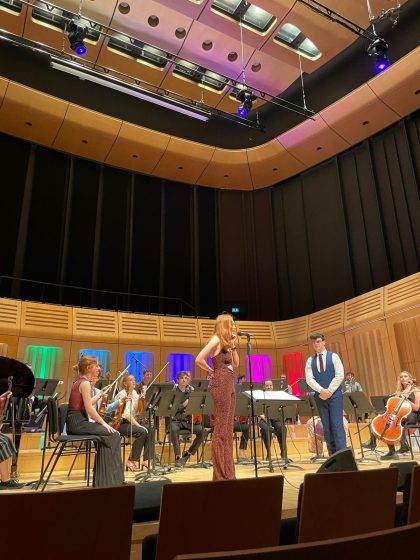
Hannah at her Orchestral Management concert.
Helen explained that a lot of the learning came from her one to one sessions with a mentor throughout the Spring term when working on concert planning.
‘The sessions have been really useful because you can talk through what’s going well, and get advice, which allows us to learn from the process.’
She also learned a lot from the project she had to do with this module. Teaming up with composition & conducting student Dane Madrigal, she put on a concert in St Peter’s church in Roath, highlighting American sacred music.
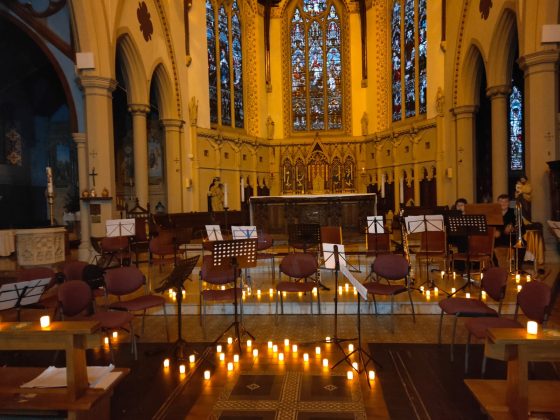
Helen’s concert set up in St. Peter’s church, Roath.
Helen brought together a chamber orchestra and choir for the concert as well as organising rehearsals to bring it all together on stage.
‘This was the first time I’d put on a concert. The audience had really positive feedback which was really nice to hear.
I had such a learning experience. I now know now what works, what doesn’t work and which is the best way to do it. So, I’m putting what I’ve learned into practice, doing a project for REPCo.’
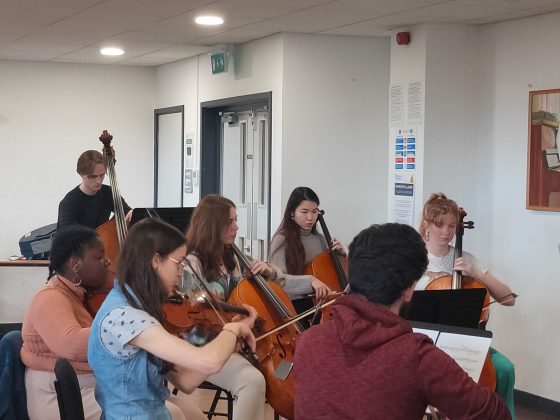
Helen’s concert in rehearsal at the College.
REPCo, (Repertory by Entrepreneurial Performers Company) is the College’s student led arts company, which gives students a chance to bid for and then put on their own shows, providing valuable hands-on experience.
Hannah put on her Orchestral Management project during the Spring REPCo festival.
‘The planning was hard work, but the concert went really well on the day. I had senior team members tell me that it was professionally done, and the tech team said the schedule I created helped it to run so smoothly.’
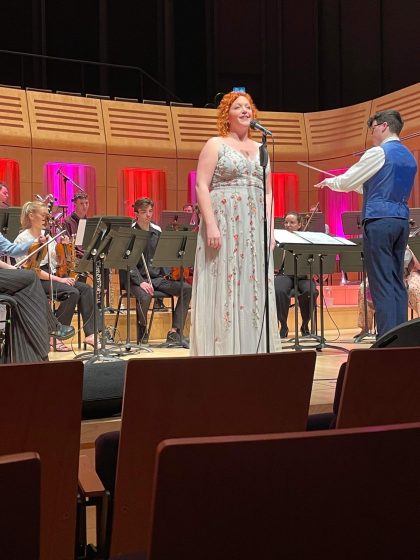
Gaining experience through placements
In the Spring, full-time Arts Management students go on a 90 hour placement.
Helen worked with Naomi Bailey, the College’s Orchestral and Ensemble Manager.
‘That was really valuable, I learnt a lot of hands-on stuff. Naomi talked me through everything so clearly and structured the placement so that by the end of it I was doing everything by myself.’
Hannah worked with Sinfonia Cymru, the UK’s leading under 30s orchestra, and found she really enjoyed working at a smaller organisation.
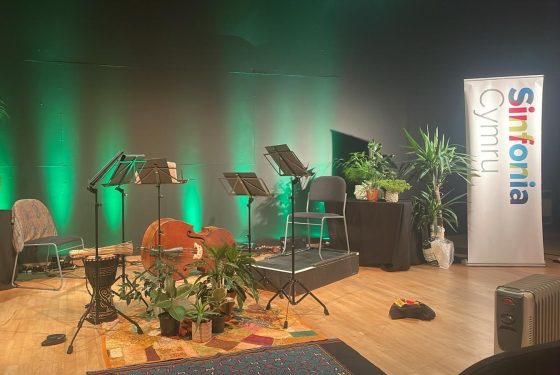
Hannah on placement with Sinfonia Cymru.
‘I loved that you get to be a part of every bit of the process, but I’m also looking forward to going to work with BBC NOW for my summer placement as it’s such a different, larger organisation.
I chose to go there because it focuses on other areas within the orchestra – education, marketing, broadcasting – and I can choose to go wherever I want, which is going to be exciting.’
Similarly, Helen chose her placement with Bath Festival Orchestra to get a very different experience.
‘I’ll be remote working, with trips to London and Bath. It’s orchestral management, but I’ll also be covering education, marketing and finance.’
‘The course definitely prepares you for the industry,’ said Hannah. ‘Especially if you do the orchestral management placements. It gives you everything you need to walk straight into a job.’
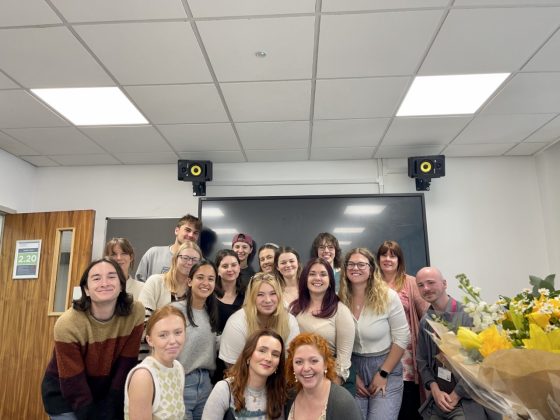
Hannah, Helen and the rest of the Arts Management class with Head of Arts Management, Karen Pimbley.
Thanks to Hannah and Helen for talking to us about their experience on the course, and we wish you all the best for your Summer placements.
Take a look at the Arts Management course and the Orchestral Management pathway.
Related Stories:
Arts Management: Iceland Symphony Orchestra’s Managing Director Lára
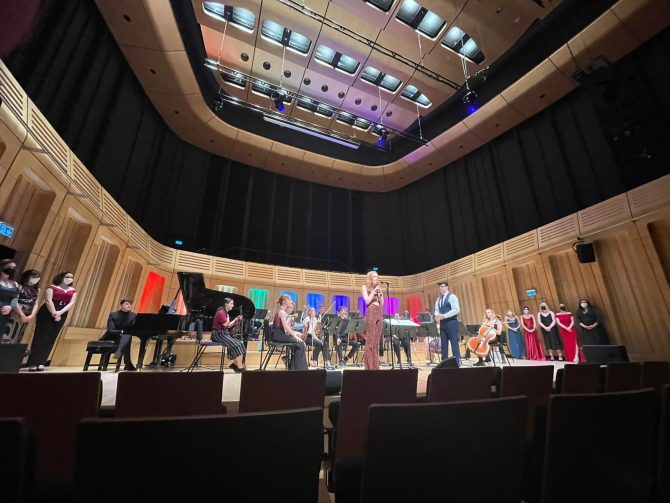
Share on Twitter
Share on Facebook